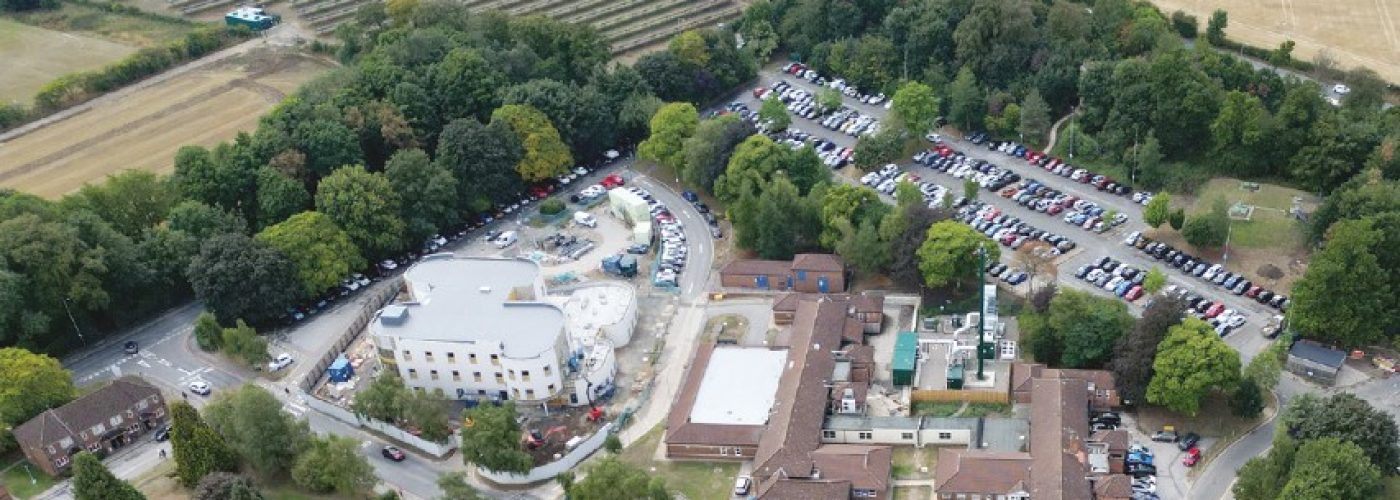Achieving the NHS’s aim of becoming the world’s first fully net zero carbon national health service by 2045 will rely upon thousands of NHS professionals in diverse settings and roles, including its clinicians, managers, estates leaders and operations experts. Maria Manidaki (right), Technical Director, Decarbonisation, Mott MacDonald examines what is needed.
NHS England’s “Delivering a ‘Net Zero’ National Health Service” report recognises that achieving ambitious net zero targets in an organisation so complex and specialised is a significant challenge.
Its teams will need to work collaboratively to drive a substantial transformation of the NHS’s built environment and infrastructure assets, while continuing to prioritise high standards of care, which will also need to be decarbonised.
With the net zero goal in mind, NHS decision-makers will need to begin translating net zero goals into strategy, and then into real-world programme and projects. While everyone is clear about the scale and urgency of our climate challenge, the sector cannot make the case for investment or take practical action without good governance, synergies and trade-offs with other objectives and value for money.
Those diverse decision-makers will often be responsible for busy, sensitive clinical environments, estates projects, or operational resources. To ensure they can play their part in achieving a net zero NHS, it’s crucial to ensure they’re supported to deliver low carbon impact in their day-to-day work. Baking it into organisational governance, alongside well-established ingredients like finance and clinical models. And, providing them with the tools for success.
This is where PAS 2080 excels and is already making a difference in the UK’s infrastructure sector.
PAS 2080 is a global specification for managing whole life carbon within infrastructure and the wider built environment, recently updated in 2023. It provides an effective, practitioner focused framework for reducing carbon emissions throughout the lifecycle of infrastructure projects, with a focus on systems-thinking, whole-life carbon management and value chain collaboration. The PAS 2080 carbon management process enables every decarbonisation project practitioner, no matter the role, to consistently and straightforwardly understand their baseline emissions and establish clear accountability for their projects. It also creates a framework to engage with their teams and supply chains to influence and measure the progress they make.
In addition to driving best practices for the further decarbonisation of NHS estates, the use of PAS 2080 also has the potential to better enable holistic thinking about the role of carbon. That includes thinking about carbon alongside achieving cost, nature, circularity, climate resilience and care outcomes. As the NHS’s decarbonisation objectives go beyond estates to include its Scope 3 indirect emissions, like medicines, telemedical devices, IT services and travel, this is going to be essential to achieve success.
In practical terms, that means addressing complex clinical challenges, like the 2% of the NHS’s emissions footprint that are generated by its use of current anaesthetic gases. But, those gases play a critical role in
providing a high standard care, and will have established cost and supply chain arrangements that make them
effective.
It’s imperative to enable and empower NHS teams to address the problem at every level, with creativity and
confidence. By looking at whole-life carbon emissions from the materials, energy and other consumables used
throughout the lifespan of assets, the NHS can make important whole life carbon and cost reductions. It will also better understand the impact of maintaining, repairing, repurposing, adapting, upgrading, expanding and eventually repurposing or removing them.
PAS 2080’s application of value chain collaboration is key. This enables NHS managers to assign accountability for sustainability and engagement at multiple levels, as well as incorporate it into the work of each department. It also outlines what targeted engagement is required with clinical professionals and the wider supply chain to evaluate and implement selective decarbonisation initiatives.
Taken together, this can provide the creativity and confidence required. It enables an NHS Trust and its teams to approach different carbon hotspots such as anaesthetic gases, where innovative new solutions will need to be fully evaluated and then delivered by a complex supply chain. It enables the diverse range of professionals who will deliver a net zero NHS to consistently break down the challenge and make success possible.
As the government develops and progresses a new 10-year Health Plan, using PAS 2080 can help shape better operational and capital expenditure, with a clear understanding of its stakeholder requirements and wholelife value of the interventions it makes. In doing so, it can demonstrate value for money, as well as the delivery of carbon reduction alongside care and resource efficiency.
Other sectors with comparable challenges are already implementing the principles of PAS 2080 with success. Some asset owners have gone for full verification to PAS2080, while others have considered the carbon management framework principles and have developed their own carbon management approaches.
For example, Heathrow Airport is a 24/7 operational environment, with an aircraft taking off and landing close to every 45 seconds. It is using good carbon management practices, including the principles of PAS 2080 to identify, pioneer, test and standardise the use of new low carbon construction materials, as well as considering lower carbon assets across different asset delivery programmes. Heathrow Airport has developed its own carbon management framework following good principles from PAS2080 to ensure its stakeholders are properly engaged, its suppliers understand their requirements clearly and whole-life carbon reduction performance can be properly understood.
But, while delivering the net zero pledge will not be simple in the NHS, adopting good industry practice solutions like PAS 2080 can ensure its achievable for every part of our healthcare system – whether it is to identify and target carbon hotspots in the supply chain for the consumables and products the NHS uses or simply to optimise the capital investment programme of its estates.
Building, Design & Construction Magazine | The Choice of Industry Professionals





